When Jeffrey Lionel Magee, a twelve-year-old kid, wanders into Two Mills, Pennsylvania, a legend is in the making. Before too long, the stories begin to circulate about how fast and how far he can run, about how he knocks the world’s first ever “frogball” for an inside-the-park-home run bunt, and more stories that earn him the nickname “Maniac”.
Age
Catalog sorted by age group
The Cat Who Went To Heaven

In ancient Japan, a struggling artist is angered when his housekeeper brings home a tiny white cat he can barely afford to feed. But when the village’s head priest commissions a painting of the Buddha for a healthy sum, the artist softens toward the animal he believes has brought him luck.
According to legend, the proud and haughty cat was denied the Buddha’s blessing for refusing to accept his teachings and pay him homage. So when the artist, moved by compassion for his pet, includes the cat in his painting, the priest rejects the work and decrees that it must be destroyed. It seems the artist’s life is ruined as well — until he is rewarded for his act of love by a Buddhist miracle.
This timeless fable has been a classic since its first publication in 1930, and this beautifully reillustrated edition brings the magic and wonder of the tale to a new generation of readers.
Strawberry Girl 60th Anniversary Edition (Trophy Newbery)
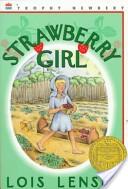
The land was theirs, but so were its hardships
Strawberries — big, ripe, and juicy. Ten-year-old Birdie Boyer can hardly wait to start picking them. But her family has just moved to the Florida backwoods, and they haven’t even begun their planting. “Don’t count your biddies ‘fore they’re hatched, gal young un!” her father tells her.
Making the new farm prosper is not easy. There is heat to suffer through, and droughts, and cold snaps. And, perhaps most worrisome of all for the Boyers, there are rowdy neighbors, just itching to start a feud.
Owl Moon: 20th Anniversary Edition
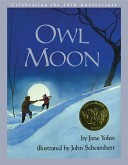
On a winter’s night under a full moon, a father and daughter trek into the woods to see the Great Horned Owl.
Traction Man Meets Turbo Dog (Traction Man)

THAT SQUARE-JAWED CAN-DO action toy, Traction Man, is back in another hilarious adventure. The little boy, Traction Man, and his brave pet, Scrubbing Brush, are inseparable—until the boy’s father throws the “unhygenic” Scrubbing Brush in the trash and replaces it with a “real” toy, the battery-operated TurboDog. It bleeps, speaks, and squeaks—but is not very smart. So Traction Man, wearing his airtight Astro-suit and armed with a bottle of SuperStrong Germo, enters the trash bin and rescues Scrubbing Brush from the Evil Bin Things (pizza crusts, spaghetti, and potato peels with eyes and mouths that hiss “Stay with us”). The Battle of the Bin is not to be missed—nor is the ignominious demise of TurboDog! With this satisfying sequel, Mini Grey has scored another smashing victory for imaginative play.
Crispin: The Cross Of Lead
The View From Saturday (Newbery Medal Book)
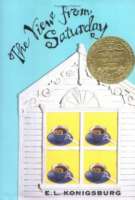
HOW HAD MRS. OLINSKI CHOSEN her sixth-grade Academic Bowl team? She had a number of answers. But were any of them true? How had she really chosen Noah and Nadia and Ethan and Julian? And why did they make such a good team?
It was a surprise to a lot of people when Mrs. Olinski’s team won the sixth-grade Academic Bowl contest at Epiphany Middle School. It was an even bigger surprise when they beat the seventh grade and the eighth grade, too. And when they went on to even greater victories, everyone began to ask: How did it happen?
It happened at least partly because Noah had been the best man (quite by accident) at the wedding of Ethan’s grandmother and Nadia’s grandfather. It happened because Nadia discovered that she could not let a lot of baby turtles die. It happened when Ethan could not let Julian face disaster alone. And it happened because Julian valued something important in himself and saw in the other three something he also valued.
Mrs. Olinski, returning to teaching after having been injured in an automobile accident, found that her Academic Bowl team became her answer to finding confidence and success. What she did not know, at least at first, was that her team knew more than she did the answer to why they had been chosen.
This is a tale about a team, a class, a school, a series of contests and, set in the midst of this, four jewel-like short stories — one for each of the team members — that ask questions and demonstrate surprising answers.
An American Plague
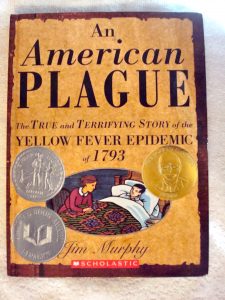 It’s 1793, and there’s an invisible killer roaming the streets of Philadelphia. The city’s residents are fleeing in fear. This killer has a name–yellow fever–but everything else about it is a mystery. Its cause is unknown and there is no cure. This powerful dramatic account by award-winning author Jim Murphy traces the devastating course of the epidemic. An American Plague offers a fascinating glimpse into the conditions in American cities at the time of our nation’s birth while drawing thought-provoking parallels to modern-day epidemics.
It’s 1793, and there’s an invisible killer roaming the streets of Philadelphia. The city’s residents are fleeing in fear. This killer has a name–yellow fever–but everything else about it is a mystery. Its cause is unknown and there is no cure. This powerful dramatic account by award-winning author Jim Murphy traces the devastating course of the epidemic. An American Plague offers a fascinating glimpse into the conditions in American cities at the time of our nation’s birth while drawing thought-provoking parallels to modern-day epidemics.
Golem
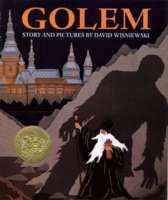
Retold from traditional sources and accompanied by David Wisniewski’s unique cut-paper illustrations, Golem is a dramatic tale of supernatural forces invoked to save an oppressed people. It also offers a thought-provoking look at the consequences of unleashing power beyond human control. The afterword discusses the legend of the golem and its roots in the history of the Jews.
A Caldecott Medal Book.
The Great Snake: Stories From The Amazon
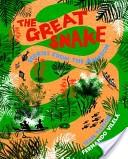
As the Rio Afuá ferry wends its way along the Amazon, Sean Taylor takes in not only the sights and sounds of this extraordinary landscape but also the stories of the people he meets. From sly jaguars and the slowest of sloths to spine-tingling giant serpents and white-suited strangers, his retellings teem with legendary beings, vivid color, earthy comedy, and the mysteries of the rainforest. Together, with Fernando Vilela’s dramatic, color-saturated illustrations, they reveal the Amazon peoples’ beliefs and way of life. Notes and a glossary provide additional information about the region.

